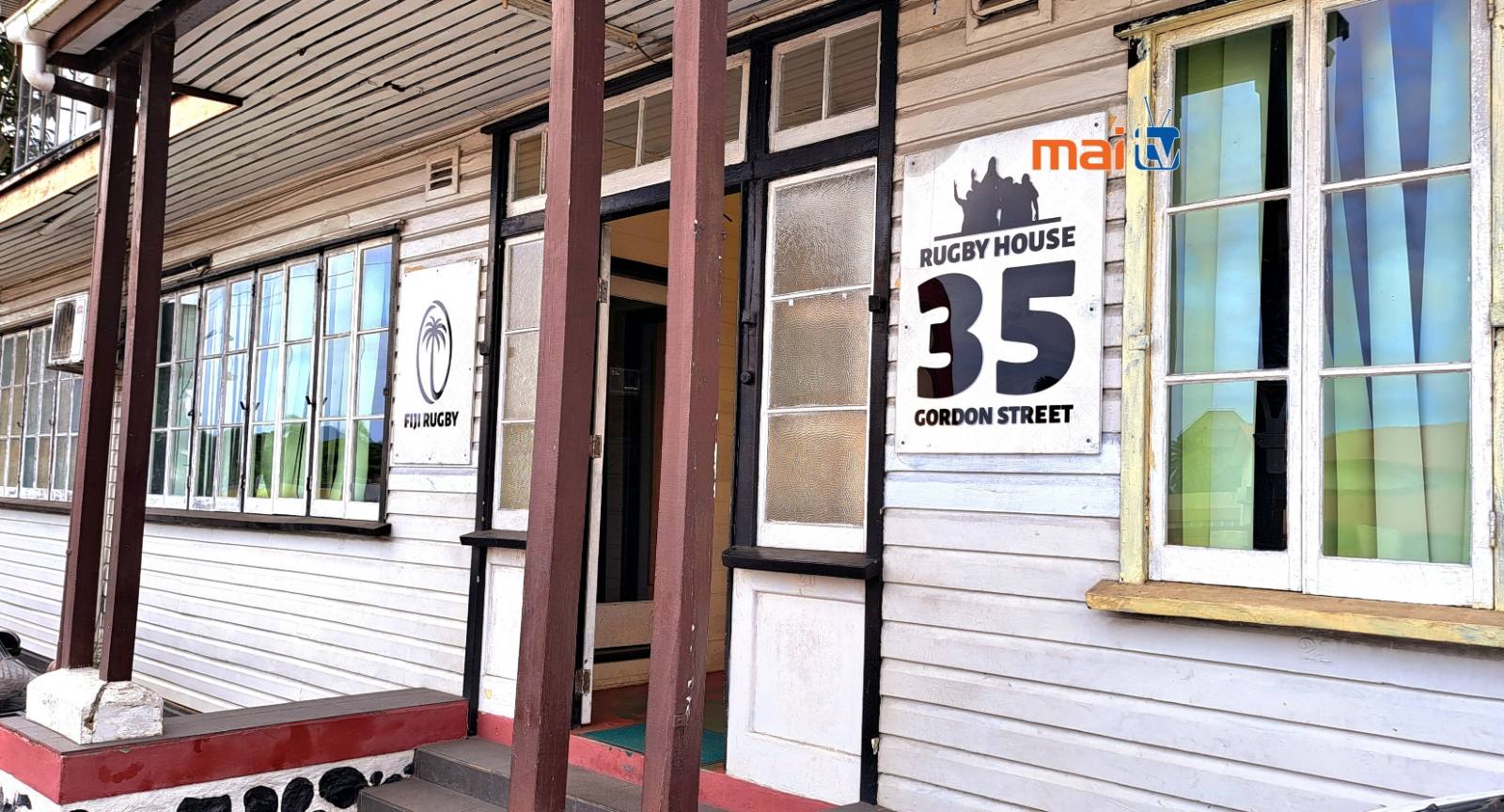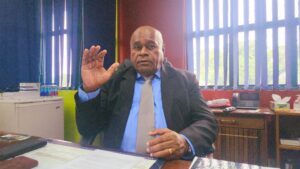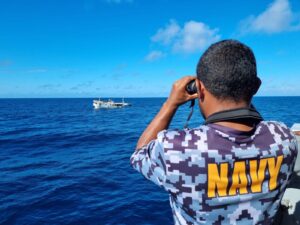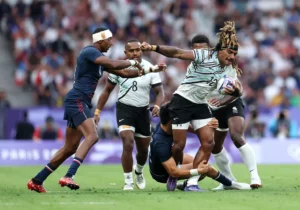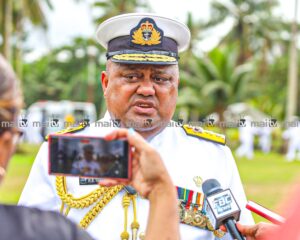The Fiji Rugby Union (FRU) Board of Trustees plans to hold meetings with unions, stakeholders, and sponsors to address their concerns and gather input.
The aim is to shape Rugby House in a way that fulfills its national and international commitments while ensuring sustainability.
This initiative comes in response to the FRU’s financial difficulties, which include a historical debt of over $3 million, a loss of $1.5 million from the 7s program, an overdraft exceeding $800,000, and the possibility of additional hidden debts arising as the trustees scrutinise Rugby House’s financial records.
Upon reviewing the financials of the 7s program, the Trustees discovered that despite initially appearing to generate a small profit, the program actually operated at a loss. This realization suggests that the overall debt might be even higher.
The Trustees acknowledge that it would be unfair to rely solely on government support to pay off the debts. Instead, they have outlined several strategies to secure funding while maintaining a balance between sustaining all programs, including sponsored competitions and development initiatives, and reducing debt. These strategies include seeking input from stakeholders and unions, implementing sound budget practices, pursuing additional funding from sponsors and gate-takings, and implementing cost-cutting measures to free up funds.
Meet With Unions
The FRU is focused on meeting with the unions, including secondary schools and primary schools rugby, to gather input and address concerns. They aim to develop a new structure for Fiji Rugby and seek support for its implementation through the Annual General Meeting (AGM).
“Part of what we are doing is meeting everyone who has a major part to play with FRU, and that is of course our unions. 24 of them. We are going out to meet with all of them, and we are issuing questionnaires so we get some idea of their concerns and issues that they would like to raise with us so we can then get their input about what they think is the future of Fiji Rugby.
“I know everybody will tell me that we are short of money they want money. We all want more money and I am afraid we can’t give more, and we can’t give what we don’t have. We have already started meeting with secondary schools rugby and primary schools rugby and this will continue. so that we hope that by the end of this year, we will be able to go back to them and tell them what the new structure is going to look like, and ask for their support to get it through the AGM.”
Cost Reduction for 7s
Recognising the need to implement cost-cutting measures for the 7s program, the FRU is re-evaluating expenses including player camps to reduce unnecessary spending and find more cost-effective alternatives.
“Yes, we will be looking at budget cuts,” FRU Board of Trustees chairman Peter Mazey said. “It’s quite hard to send all our players into camps for a long time and for those camps to be held at tourist resorts, we see in budgets – $25000 a week, we can’t afford that. We are going to have to relook at what we will do on that.”

Photo: Fiji Rugby
Seek Additional Funding From Sponsors
The Fijian rugby union relies heavily on sponsorship and funding from companies and sponsors to support its operations and tournaments. While the union appreciates the support received from sponsors like Fiji Water, Mazey says there is a need for more sponsorship from local Fijian companies.
“I would like you all to put across that we have a large number of Fijian companies that we are very very proud of, that we don’t get sponsorship from, at all, but there are only one or two companies that have come to the fore,” Mazey said.
Ensure Sponsors Fully Fund Tournaments
Not sourcing funds from sponsors to fully fund the tournaments they run has also been identified as one of the problems across various programs with Rugby House including hosting tournaments. To host the Farebrother and Skipper Cup alone involves significant costs, with an estimated expenditure of over $1 million.
“We haven’t asked our sponsors to fully fund the various tournaments we run and that is something we will be working with our commercial team, with management that we need to do proper budgeting,” FRU trustee member Jenny Seeto said. “So when we go out to look for money, we know what to ask our sponsors for, and show our sponsors and be transparent about where our costs are going and that is really important and that is one of the reasons why we are in overdraft because we just haven’t had enough money to fund our various programs.”
Accurate Budgeting And Increased Scrutiny of Financial Information
Seeto said obtaining detailed information on the 7s program within a short period and debunking the assumption that the 7s program was highly profitable was only possible when they broke down the costs and revenues of the men’s and women’s teams and every tournament played. They were able to gain a clearer understanding of the financial situation.
“I think one of our achievements is the 7s getting the financials out on the 7s and knowing exactly where we stand. I think that was a great achievement. Because we were told by the rugby fraternity that 7s is making so much money and it isn’t. And it is uncovering elements such as those. And we did that within two weeks, we asked for information. It took about two weeks for the finance team to give us the format that we wanted. Because we have broken it down to very detailed now – the men’s team, the women’s team, every tourney we played in the last season, every cost, everything is broken down.”
The same detailed reporting format will be applied to other tournaments and programs to acquire comprehensive financial information for all aspects of their operations.
“So what we have to do is to beef up the finance team, we acknowledge we have to do that. We have to ensure that the chartered accounts are set up properly so that information flows well. Otherwise, when we are asking them for information, it is taking them time to provide the information, so we are going back to basics.”
Tuinamuana said there is also a shift towards more accurate budgeting practices to provide actual costs of running programs at Rugby House instead of just creating unrealistic budgets to fulfill requirements.
“Instead of a pie-in-a-sky budget that management just did just to tick a box, the budgeting is a lot more accurate, and we are querying the budget a lot, and pushing back on a lot of things. And saying why is this and why is this? You haven’t picked up this cost. So now we are getting a true picture of what it costs to run programs at Rugby House.”
The FRU has also extended its focus beyond Rugby House budgets to include schools’ rugby budgets.

Alternative Revenue Streams
The Trustees also recognise that rugby in Fiji has not been effectively monetised or leveraged to its full potential, which could have financial benefits for the sport and its development.
Seeto said: “As a country, I don’t think we have monetised rugby well enough and that is something that we need to look at and see what we can do about it,” Seeto said adding that “there is a thinking of what we have in mind for the future.”
Gate-Takings
Mazey also highlighted the significance of gate revenue, and the intention to mobilise the Fijian community to contribute financially and support the organisation’s efforts to address its financial challenges.
He said merely watching games on TV without actively contributing financially does not address funding needs, calling on the public to turn up in numbers when the Flying Fijians take on the Tongans next month, in their lone July Test fixture.
The match is scheduled for 12midday on Saturday, July 22 at Churchill Park in Lautoka.
“We want every Fijian there because that is how we will start clearing our debts. Yes, we might go out and ask the public for funding, I will go out and ask everybody for a dollar. please, we need them.”
Improving Management
The trustees have also committed to improving management practices, instilling a positive work environment, enhancing communication channels, and promoting accountability and transparency within Rugby House to assist in efforts to advance rugby in the country.
“Another major focus for us as well is improving the management, particularly with the limited resources we have. There is a lot of demand for that,” Tuinamuana said, “The other big achievement is our chair has been at rugby house every day, and he has been working with management and staff to define, understand and see how things can be improved. And our understanding is that morale at Rugby House has improved a lot. We really want to improve rugby. Rugby is so important to this country. We just want to make sure that we are doing the right thing. We are all volunteers but we have rugby at heart.”
Seeto echoed the same sentiments saying they have had discussions with management staff to underline the importance of accountability honesty and communication.
“We are having conversations with them, explaining what needs to be done, how things should be done, and how things should be run, and stressing that we do want accountability and honesty,” Seeto said. “We don’t want surprises. Things that have happened that we need to be aware of, things that they are not sure of, they should ask. So very basic HR principles. We are trying to introduce those practices and stressing to the team – that we are all one team and… we need to work together, we are not out to get anyone, we just want to work together to get things moving forward.”
Set-Up of An Investigation Team
The Fijian Rugby Union will be setting up an investigation team, the TOR for which has been set, to look into the circumstances surrounding various incidents including specific areas such as budgeting, approval processes for Fijiana allowances, and events like the Wallaroos Test and Oceania Test in Australia.
According to Mazey, no criminal actions have been discovered so far, and the objective of the investigation is to understand why certain decisions were made and policies were not followed with a view to preventing such from occurring again in the future.
“The objective of having this investigation is just to establish the facts of what happened, things like why were the Fijiana girls promised $300 when the policies say $100. Because they were promised $300, we will honour that commitment. But, we shouldn’t have done that. There is a policy in place, Why are they going outside policy? So we need to know why these things happen – not necessarily people are going to be taken to task. We are looking at the report, but if there is a criminal element, obviously we will pass that on to the authorities.
World Rugby Reporting Timeline
Mindful of the commitment they made to World Rugby to address issues and facilitate necessary changes and improvements at Rugby House within a specified timeframe, the trustees are calling for support.
“We are on a timeline. We have made a promise with World Rugby that we will go back by January next year. We have set our own timelines for what we want to do, and already we are getting a little behind on those because of what we have been finding. But I’m sorry for having to report on all this, But by doing that, we can move forward. And we are relying on your support.”

